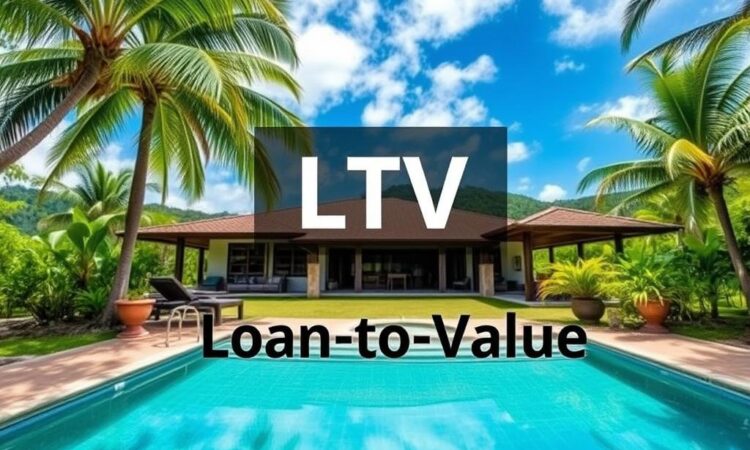
Loan-to-Value (LTV): The Key to Profitable Private Money Investing in Costa Rica
At GAP Investments, we understand the unique needs of foreign and expat investors looking to capitalize on Costa Rica’s thriving real estate market. We prioritize safety and risk management, offering a secure investment environment tailored to their requirements.
The Loan-to-Value (LTV) ratio is a critical metric that reflects the relationship between the amount borrowed and the appraised value of a property. For instance, a $100,000 property with a 10% down payment ($10,000) and a loan of $90,000 has an LTV ratio of 90%. The higher the LTV ratio, the riskier the loan is for the lender.
We use LTV as the primary criteria for structuring private loans, offering competitive interest rates ranging from 12% to 18%. By understanding and managing LTV ratios, both lenders and investors can maximize profits while maintaining appropriate risk levels in Costa Rica’s attractive investment landscape.
Understanding Loan-to-Value Ratio in Real Estate Investing
When investing in real estate, particularly in a foreign market like Costa Rica, understanding the Loan-to-Value (LTV) ratio is crucial. The LTV ratio is a percentage that represents the relationship between the loan amount and the appraised value of a property.
What Is LTV and How Is It Calculated?
The LTV ratio is calculated by dividing the loan amount by the appraised value of the property. For instance, if a property is appraised at $100,000 and the loan amount is $70,000, the LTV ratio is 70%. In Costa Rica, property valuation is typically determined by professional appraisers, who often consider recent sales data to arrive at a fair market value.
Why LTV Matters to Lenders and Investors
LTV is a critical risk assessment tool for lenders, as it indicates the level of risk associated with a loan. Higher LTV ratios signify greater risk, while lower ratios suggest safer investments. For investors, understanding LTV is vital for evaluating potential returns and managing risk. Different lenders in Costa Rica, including banks and private money lenders, use LTV differently in their lending decisions, with private lenders typically preferring lower LTV ratios for added security.
The Costa Rican Real Estate Investment Landscape
Costa Rica’s real estate market is experiencing a significant surge in foreign investment, driven by its natural beauty and stable economy. According to recent reports, foreign investment in Costa Rican real estate increased by over 20 percent in the past year alone.
Current Market Trends for Foreign Investors
The Costa Rican real estate market remains stable with steady property appreciation, especially in sought-after locations like Guanacaste, San José, and coastal towns along the Pacific. Properties in these regions have appreciated by 8 to 15 percent annually, driven by strong buyer demand, limited inventory, and increased tourism infrastructure. Foreign investors have the same ownership rights as locals for most properties, although there are special considerations for maritime zone properties. For those looking to invest, private money lending options are available, offering flexible financing solutions.

Unique Challenges of Financing in Costa Rica
Despite the attractive market trends, foreign investors face significant challenges when seeking traditional financing in Costa Rica. These challenges include residency requirements, extensive documentation needs, and the reluctance of local banks to lend to non-residents. This creates opportunities for private money lenders who understand the market and can offer tailored solutions. By exploring alternative financing options, investors can navigate these challenges and capitalize on the country’s growing real estate market.
Loan-to-Value-LTV-The-Best-Criteria-for-Private-Money-Investing-in-Costa-Rica
When it comes to private money investing in Costa Rica, understanding the loan-to-value (LTV) ratio is crucial. At GAP Investments, we’ve helped numerous clients succeed in the Costa Rican real estate market by leveraging our expertise in LTV.
How LTV Determines Risk and Return in Costa Rica
The LTV ratio is a critical factor in determining the risk associated with private money lending in Costa Rica. A lower LTV ratio indicates a lower risk for lenders, as there’s a larger equity cushion in case of default. Conversely, a higher LTV ratio increases the risk, potentially leading to higher interest rates to compensate for this increased risk.
Typical LTV Ratios for Different Property Types
LTV ratios vary significantly depending on the type of property in Costa Rica. For constructed properties, private lenders typically offer LTV ratios between 50% to 60%. In contrast, raw land is often considered too risky, with many private lenders avoiding it altogether. Banks may offer higher LTV ratios, up to 80% for constructed properties and 70% for building lots. Some banks even provide 100% LTV for new real estate developments.
At GAP Investments, we use LTV as a primary factor in determining interest rates for our income-generating mortgage loans. Our loans range from $50,000 to over $3,000,000 USD, with competitive interest rates between 12% to 18% annually. By understanding LTV, foreign investors can negotiate better terms with private lenders and make informed decisions about their investments in Costa Rica.
Comparing Financing Options in Costa Rica
When investing in Costa Rica’s real estate market, understanding the various financing options available is crucial for making informed decisions. Costa Rica offers a diverse range of financing solutions for investors, including traditional bank loans, private money lending, and seller financing.
Traditional Bank Loans vs. Private Money Lending
Traditional bank loans in Costa Rica, offered by banks such as BAC San José, Banco Nacional, and Scotiabank, come with interest rates ranging from 7% to 9.5% and require down payments of 30% to 50%. In contrast, private money lending, as offered by companies like GAP Investments, provides more flexible terms but at higher interest rates, ranging from 12% to 18%. The approval process for bank loans is stringent, requiring extensive documentation and often verification of residency status. In contrast, private lending focuses on the property’s value and the Loan-to-Value (LTV) ratio.
Seller Financing and Alternative Options
Seller financing is an increasingly popular alternative in Costa Rica, offering terms of 1 to 3 years and interest rates ranging from 6% to 9%. This option requires careful legal structuring to protect both parties.  Other alternative financing options are also available, catering to different investor profiles and property types. Understanding these options is key to selecting the most appropriate financing strategy for your investment goals in Costa Rica.
Other alternative financing options are also available, catering to different investor profiles and property types. Understanding these options is key to selecting the most appropriate financing strategy for your investment goals in Costa Rica.
GAP Investments: Private Money Lending in Costa Rica

At GAP Investments, we specialize in providing private money lending solutions for foreign investors looking to capitalize on Costa Rica’s thriving real estate market. Our expertise lies in offering tailored financing options that cater to the unique needs of expat investors.
Loan Programs and Interest Rates
We offer loan amounts ranging from $50,000 to over $3,000,000, with interest rates between 12% and 18% annually, primarily based on the Loan-to-Value (LTV) ratio. Our loan terms are flexible, spanning from six months to three years, allowing investors to choose a repayment schedule that suits their investment strategy.
Qualification Requirements and Process
Our qualification process focuses on the property’s value and LTV ratio, rather than extensive personal financial documentation. This approach makes our loans accessible to foreign investors who may struggle with traditional financing options. We prioritize safety and risk management by conducting thorough due diligence on property valuations and implementing robust legal protections for both lenders and borrowers.
By choosing GAP Investments, foreign investors can benefit from our expertise and secure private money loans to acquire profitable properties in Costa Rica. Our LTV-based lending approach has helped numerous investors achieve their goals, and we invite you to explore our loan programs further.
How LTV Affects Your Investment Returns
Understanding how Loan-to-Value (LTV) ratios impact investment returns is crucial for real estate investors in Costa Rica. The LTV ratio is a critical factor that determines the profitability of investments in the Costa Rican real estate market.

When investing in Costa Rican real estate, the LTV ratio plays a significant role in shaping investment returns. A lower LTV ratio typically results in better loan terms, including lower interest rates, as it poses less risk to lenders.
Balancing Leverage and Risk
Leverage is a double-edged sword in real estate investing. On one hand, using financing with appropriate LTV ratios can amplify returns. On the other hand, higher leverage increases the risk associated with the investment. We need to strike a balance between leveraging our investment and managing risk.
A conservative LTV ratio, such as 50%, may result in lower returns due to the lower amount of borrowed funds, but it also reduces the risk of default. Conversely, a higher LTV ratio, such as 70%, may lead to higher returns but also increases the risk of negative equity if the property market declines.
Case Studies: Successful LTV Strategies
We’ve observed successful investors in Costa Rica employing different LTV strategies to maximize their returns. For instance, some investors have used low LTV ratios for long-term buy-and-hold investments, minimizing their risk exposure. Others have opted for higher LTV ratios for shorter-term property flips, aiming to amplify their returns.
At GAP Investments, we help our clients determine the ideal LTV ratio for their specific investment situation, taking into account factors like property type, location, market conditions, and the investor’s financial goals and risk tolerance.
Securing the Best LTV for Your Investment
Maximizing your investment potential in Costa Rica’s real estate market requires a strategic approach to Loan-to-Value (LTV). A favorable LTV ratio is crucial for securing better loan terms and maximizing returns on your investment.

Property Valuation in Costa Rica
A professional appraiser typically determines the value of a property in Costa Rica. Lenders also consider recent sales data and market trends when evaluating property value. For instance, if a property has been sold recently, the lender may use the lesser of the appraised value and the purchase price to determine the LTV ratio, especially if the sale occurred within the last 1-2 years.
Regional market variations in Costa Rica can significantly impact property valuations. Properties located in established areas like Guanacaste or the Central Valley may receive more favorable valuations and LTV ratios compared to those in emerging markets.
Improving Your LTV Position
To secure a better LTV ratio, investors can employ several strategies. Making strategic property improvements, increasing down payments, or structuring creative financing arrangements can lead to more favorable loan terms. For example, buyers can negotiate purchase prices with an eye toward future financing, taking into account recent comparable sales and market trends that influence property valuation and LTV calculations.
For expert guidance on presenting your property in the best light during the valuation process, consider consulting with professionals like GAP Investments, who can help highlight key features and improvements that positively impact appraisals and secure better LTV ratios.
Risk Management for Private Money Investors
In Costa Rica’s dynamic real estate market, private money investors face unique challenges that require robust risk management strategies. Effective risk management is crucial to protect investments and ensure successful outcomes.
Due Diligence on Costa Rican Properties
Thorough due diligence is essential when investing in Costa Rican properties. This process involves several key steps, including title searches, property surveys, permit verification, and environmental assessments. These measures help ensure that the property provides adequate security for the loan and identify potential issues before they become major problems.
Legal Protections for Foreign Investors
Foreign investors in Costa Rica benefit from robust legal protections. A licensed notary public is required by law to oversee real estate closings, transfer ownership, and register the property title. Properly registered mortgages (hipotecas) provide additional security, and a well-defined foreclosure process is in place in case of default. Understanding these legal protections is vital for private money investors to mitigate risks effectively.
Conclusion: Maximizing Profitability Through Strategic LTV
In Costa Rica’s dynamic real estate landscape, the Loan-to-Value ratio serves as a cornerstone for successful private money investing. At GAP Investments, we recognize the significance of LTV in assessing risk and potential return. Our tailored financing solutions are designed to help investors achieve their goals while maintaining a secure investment environment.
By prioritizing LTV in your investment strategy, you can ensure sustainable profitability and reduced risk exposure. Our expertise in the Costa Rican market, combined with our commitment to risk management, makes us an ideal partner for private investors. We invite you to explore private money lending opportunities in Costa Rica with us.
To learn more about our LTV-based lending approach and how it can help you achieve your investment objectives, please visit our website at www.gapinvestments.com or contact us directly at +(506)-4001-6413 or USA/Canada (855)-562-6427. Let’s work together to maximize your returns in Costa Rica’s thriving real estate market.
Article by Glenn Tellier (Founder of CRIE and Grupo Gap)
